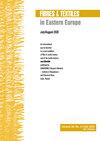不同基材制备聚吡咯涂层导电织物性能的研究
IF 0.9
4区 工程技术
Q3 MATERIALS SCIENCE, TEXTILES
引用次数: 0
摘要
摘要本文以吡咯为单体,对甲苯磺酸为掺杂剂,过硫酸铵为氧化剂,采用简单的液相原位聚合法制备了聚吡咯涂层导电织物。以涤棉混纺织物、尼龙织物、羊毛织物、真丝织物、玄武岩织物和芳纶织物为基料,在相同的工艺条件下,分别制备了6种导电聚吡咯涂层织物;比较了其电导率,研究了聚吡咯在织物表面的分布和耐洗涤牢度。结果表明,在相同的工艺条件下,聚吡咯涂层涤纶织物的导电性能最好,其次是聚吡咯涂层尼龙织物和聚吡咯涂层羊毛织物。电镜观察发现,聚吡咯在不同基布上的分布较为均匀。洗涤后得出聚吡咯与涤棉、尼龙、羊毛的结合牢度较好,而与玄武岩、芳纶的结合牢度较差。本文章由计算机程序翻译,如有差异,请以英文原文为准。
Research on the Performance of Polypyrrole Coated Conductive Fabrics Prepared from Different Base Materials
Abstract In this paper, polypyrrole coated conductive fabrics were prepared using pyrrole as the monomer, p-toluene sulfonic acid as the doping agent and ammonium persulfate as the oxidant, adopting the simple method of situ polymerization of the liquid phase. Six types of conductive polypyrrole coated fabrics were prepared adopting polyester-cotton blended fabrics, nylon fabrics, wool fabrics, silk fabrics, basalt fabrics and aramid fabric respectively as base materials and using the same process conditions; its electrical conductivity was compared, and the distribution and resistance of the washing fastness of polypyrrole on the surface of those fabrics were studied. Results showed that under the same process conditions, the conductivity of polypyrrole coated terylene fabrics was the best, followed by the polypyrrole coated nylon fabrics and polypyrrole coated wool fabrics. Observed by electron microscope, the distribution of polypyrrole was more homogeneous on different base cloths. After washing, it was concluded that the combination fastness of polypyrrole with polyester-cotton, nylon and wool was better, while the combination fastness of polypyrrole with basalt and aramid was poor.
求助全文
通过发布文献求助,成功后即可免费获取论文全文。
去求助
来源期刊

Fibres & Textiles in Eastern Europe
工程技术-材料科学:纺织
CiteScore
1.60
自引率
11.10%
发文量
12
审稿时长
13.5 months
期刊介绍:
FIBRES & TEXTILES in Eastern Europe is a peer reviewed bimonthly scientific journal devoted to current problems of fibre, textile and fibrous products’ science as well as general economic problems of textile industry worldwide. The content of the journal is available online as free open access.
FIBRES & TEXTILES in Eastern Europe constitutes a forum for the exchange of information and the establishment of mutual contact for cooperation between scientific centres, as well as between science and industry.
 求助内容:
求助内容: 应助结果提醒方式:
应助结果提醒方式:


